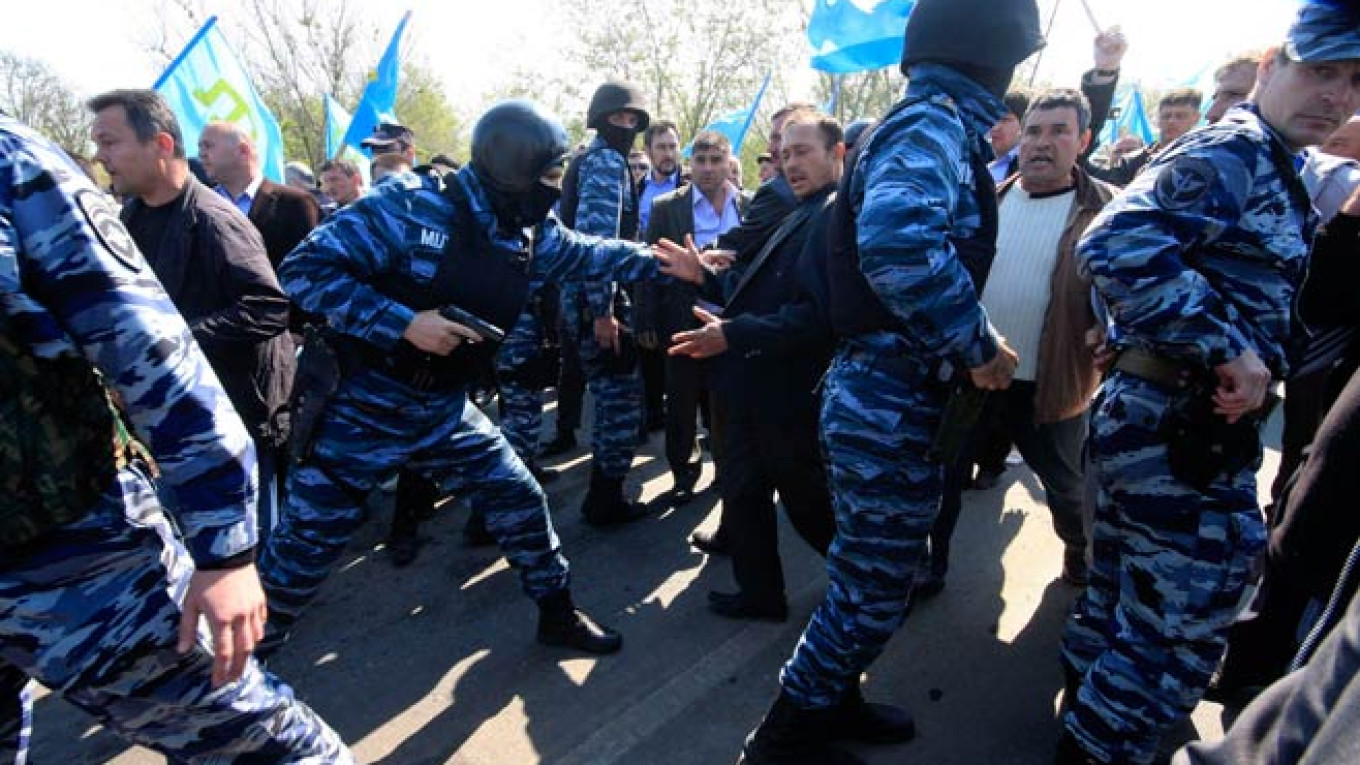Thousands of Crimean Tatars on Saturday responded to news that their spiritual leader had been banned from the peninsula by blocking several highways in a tense standoff with riot police — the first sign that the Muslim ethnic group's discontent with Russian authorities may lead to turmoil.
On Saturday, Crimean authorities promised to dish out criminal charges to the group, which numbered about five thousand, according to the BBC Russian service. The group broke through border posts near the city of Armyansk and crossed the border into the buffer zone between Ukraine and the Crimean peninsula to meet Mustafa Dzhemilev, former head of the Crimean Tatar Mejlis, the ethnic group's representative body.
The group blocked several highways near Simferopol, Bakhchysarai, Stary Krym, Yevpatoriya and Oktyabrskoye, Interfax-Ukraine reported.
The incident seems to vindicate analysts' earlier warnings that the Muslim ethnic group's disaffection with Russian authorities may lead to instability in the region. Many Crimean Tatars, who account for more than 10 percent of the Crimean peninsula's population, opposed the territory's annexation by Russia in March.
"Before the annexation many predicted that Crimean Tatars would become a headache for Russians, and now the head is already aching," said Alexei Malashenko, an Islamic studies expert at the Carnegie Moscow Center.
Malashenko warned that such protests could eventually destabilize Crimea, adding that some Crimean Tatars had already joined the Hizb-ut-Tahrir Islamist organization and even fought in Syria.
He attributed the strained ties between Crimean Tatars and Russia to "bad blood" left over from Nazi Germany, when some Crimean Tatars collaborated with Germany during its occupation of the peninsula in 1942 to 1943, and Stalin used this as an excuse for deporting the entire group to Uzbekistan in 1944.
Crimean authorities were quick to demonstrate that they would not tolerate such disorder, however. ?
Natalya Poklonskaya, the prosecutor of Crimea, said at a news conference Saturday that she had sent requests to the Investigative Committee and Federal Security Service to open criminal cases against the protesters, Ekho Moskvy radio reported.
Dzhemilev, a former Soviet dissident, headed the Mejlis from 1991 to 2013 and is currently a member of Ukraine's Supreme Rada and an ally of Ukrainian politician Yulia Tymoshenko's Fatherland party. He has been a vocal critic of Russia's takeover of Crimea.
Sergei Aksyonov, acting head of Crimea, said Friday that Dzhemilev was not welcome on the peninsula.
"This man has undoubtedly been instructed by Western intelligence agencies to destabilize the situation," Aksyonov wrote on Facebook. "We will not allow peace and stability to be broken. We will not let in anyone who is coming to us with bad intentions."
Dzhemilev told Interfax-Ukraine on Friday that he had also been banned from entering Russia at Sheremetyevo Airport when he tried to fly there by plane.
The Crimean Tatar Mejlis said on April 22 that Dzhemilev had been given a notice banning him from Russia for five years when he left Crimea for Ukraine but Russia's Federal Migration Service later denied it.
Dzhemilev criticized Crimean authorities' decision to ban him on Saturday and mockingly called Crimea an "area of Russian democracy."
"This is outrageous when some people are allowed to enter their homeland, and others are not," he said at the Russian-Ukrainian border, Ukrinform reported.
Dzhemilev also told Ukraine's Channel 5 on Saturday that Turkish authorities would assist him in regaining entry to Crimea.
Russian authorities have made some concessions to Crimean Tatars, however.
In March, Aksyonov offered Crimean Tatars the position of a deputy prime minister, two ministerial portfolios and the posts of deputy ministers. In April, President Vladimir Putin also signed a decree to rehabilitate the ethnic group, repealing Stalin's repressive policy against Crimean Tatars, while Crimean Tatar was made an official language on the peninsula.
Refat Chubarov, the current leader of the Crimean Tatar Mejlis, is seen as more moderate and willing to cooperate with Russian authorities than Dzhemilev.
"It will be hard for him to work for both sides," Malashenko said. "If he cooperates with Russia, he will not be popular among Crimean Tatars."
Contact the author at o.sukhov@imedia.ru
A Message from The Moscow Times:
Dear readers,
We are facing unprecedented challenges. Russia's Prosecutor General's Office has designated The Moscow Times as an "undesirable" organization, criminalizing our work and putting our staff at risk of prosecution. This follows our earlier unjust labeling as a "foreign agent."
These actions are direct attempts to silence independent journalism in Russia. The authorities claim our work "discredits the decisions of the Russian leadership." We see things differently: we strive to provide accurate, unbiased reporting on Russia.
We, the journalists of The Moscow Times, refuse to be silenced. But to continue our work, we need your help.
Your support, no matter how small, makes a world of difference. If you can, please support us monthly starting from just $2. It's quick to set up, and every contribution makes a significant impact.
By supporting The Moscow Times, you're defending open, independent journalism in the face of repression. Thank you for standing with us.
Remind me later.


